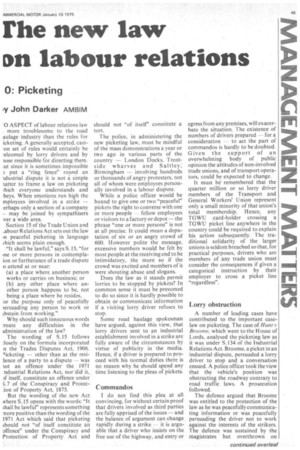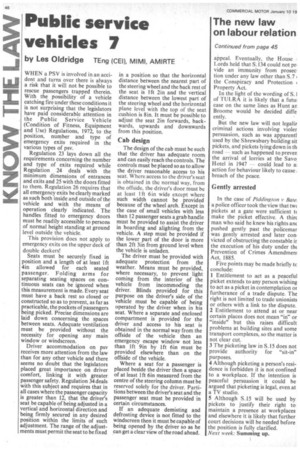rhe new law Dn labour relations
Page 47

Page 48

If you've noticed an error in this article please click here to report it so we can fix it.
0: Picketing
ly John Darker AMBIM '0 ASPECT of labour relations law more troublesome to the road aulage industry than the rules for icketing. A generally accepted, caston set of rules would certainly be ,elcomed by lorry drivers and by lose responsible for directing them. ,ut since it is sometimes impossible o put a "ring fence" round an idustrial dispute it is not a simple latter to frame a law on picketing rhich everyone understands and beys. When emotions run high the mployees involved in a strike — erhaps only a section of a company – may be joined by sympathisers iver a wide area.
Section 15 of the Trade Union and .abour Relations Act sets out the law in peaceful picketing in language vhich seems plain enough.
"It shall be lawful," says S. 15, "for ine or more persons in coritemplaion or furtherance of a trade dispute o attend at or near: (a) a place where another person works or carries on business; or (b) any other place where another person happens to be, not being a place where he resides, or the purpose only of peacefully )ersuading any person to work or ibstain from working."
Why should such innocuous words :reate any difficulties in the idministration of the law?
The wording of S.15 follows ;losely on the formula incorporated n the Trades Disputes Act, 1906. 3icketing — other than at the resi fence of a party to a dispute was lot an offence under the 1971 ndustrial Relations Act, nor'did it, )f itself, constitute an offence under 3.7 of the Conspiracy and Protec:ion of Property Act, 1875.
But the wording of the new Act where S.15 opens with the words: "It ;hall be lawful" represents something -nore positive than the wording of the 1971 Act which said that picketing ;hould not "of itself constitute an offence" under the Conspiracy and Protection of Property Act and should not "of itself" constitute a tort.
The police, in administering the new picketing law, must be mindful of the mass demonstrations a year or two ago in various parts of the country — London Docks, Trentside wharves and Saltley, Birmingham — involving hundreds or thousands of angry protesters, not all of whom were employees personally involved in a labour dispute.
While a police officer would be bound to give one or two "peaceful" pickets the right to converse with one or more people — fellow employees or visitors to a factory or depot — the phrase "one or more persons" is not at all precise. It could mean a deputation of six or an angry crowd of 600. However polite the message, excessive numbers would be felt by most people at the receiving end to be intimidatory, the more so if the crowd was excited and members of it were shouting abuse and slogans.
Does the law as it stands permit lorries to be stopped by pickets? In common sense it must be presumed to do so since it is hardly possible to obtain or communicate information if a visiting lorry driver refuses to stop.
Some road haulage spokesman have argued, against this view, that lorry drivers sent to an industrial establishment involved in a strike are fully aware of the circumstances by virtue of publicity in the media. Hence, if a driver is prepared to proceed with his normal duties there is no reason why he should spend any time listening to the pleas of pickets.
Commandos
I do not find this plea at all convincing, for without certain proof that drivers involved as third parties are fully apprised of the issues — and the balance of argument can change rapidly during a strike it is arguable that a driver who insists on the free use of the highway, and entry or egress from any premises, will exacerbate the situation. The existence of numbers of drivers prepared — for a consideration to act the part of commandos is hardly to be doubted. Given the support of an overwhelming body of public opinion the attitudes of non-involved trade unions, and of transport operators, could be expected to change.
It must be remembered that the quarter million or so lorry driver members of the Transport and General Workers' Union represent only a small minority of that union's total membership. Hence, any TGWU card-holder crossing a TGWU picket line anywhere in the country could be required to explain his action subsequently. The traditional solidarity of the larger unions is seldom breached so that, for practical purposes, drivers who are members of any trade union must consider the consequences if given a categorical instruction by their employer to cross a picket line "regardless".
Lorry obstruction
A number of leading cases have contributed to the important caselaw on picketing. The case of Hunt v Broome, which went to the House of Lords, analysed the picketing law as it was under S.134 of the Industrial Relations Act. Broome, a picket in an industrial dispute, persuaded a lorry driver to stop and a conversation ensued. A police officer took the view that the vehicle's position was obstructing the roadway contrary to road traffic laws. A prosecution followed.
The defence argued that Broome was entitled to the protection of the law as he was peacefully communicating information or was peacefully persuading the driver not to work against the interests of the strikers. The defence was sustained by the magistrates but overthrown on appeal. Eventually, the House Lords held that S.134 could not pi:, vide an immunity from prosec tion under any law other than S.7 the Conspiracy and Protection Property Act.
In the light of the wording of S.1 of TU I,R A it is likely that a futui case on the same lines as Hunt an Broome would be decided diffe ently.
But the new law will not legaliz criminal actions involving violer persuasion, such as was apparent] used by the Shrewsbury building sit pickets, and pickets lying down in th road -such as happened to preven the arrival of lorries at the Savo Hotel in 1947 — could lead to ai action for behaviour likely to cause breach of the peace.
Gently arrested In the case of Piddington v Bate. a police officer took the view that twc pickets at a gate were sufficient tc make the picket effective. A thirc man who said he knew his rights an pushed gently past the policemar was gently arrested and later con. victed of obstructing the constable ir the execution of his duty under th( Prevention of Crimes Amendmeni Act, 1885.
Five points may be made briefly tc conclude: 1 Entitlement to act as a peaceful picket extends to any person wishing to act as a picket in contemplation or furtherance of a trade dispute. The right is not limited to trade unionists or others with a link to the dispute.
2 Entitlement to attend at or near certain places does not mean "in" or "inside" but this raises difficult problems at building sites and some transport complexes, so the matter is not clear cut.
3 The picketing law in S.15 does not provide authority for "sit-in" purposes.
4 Although picketing a person's residence is forbidden it is not confined to a workplace. If the intention is peaceful persuasion it could he argued that picketing is legal, even at a TV studio.
5 Although S.15 will be used by pickets to justify their right to maintain a presence at workplaces and elsewhere it is likely that further court decisions will be needed before the position is fully clarified.
Next week: Summing up.




































































































